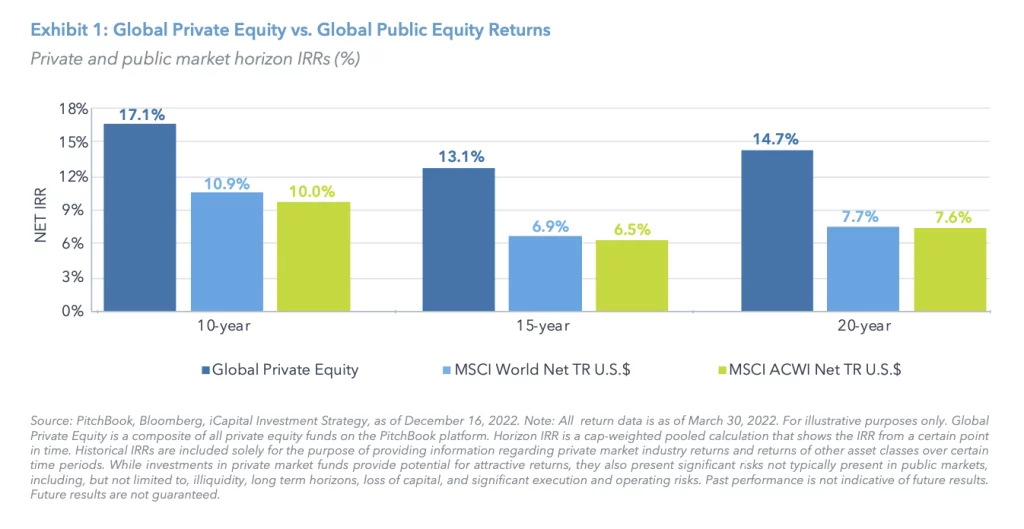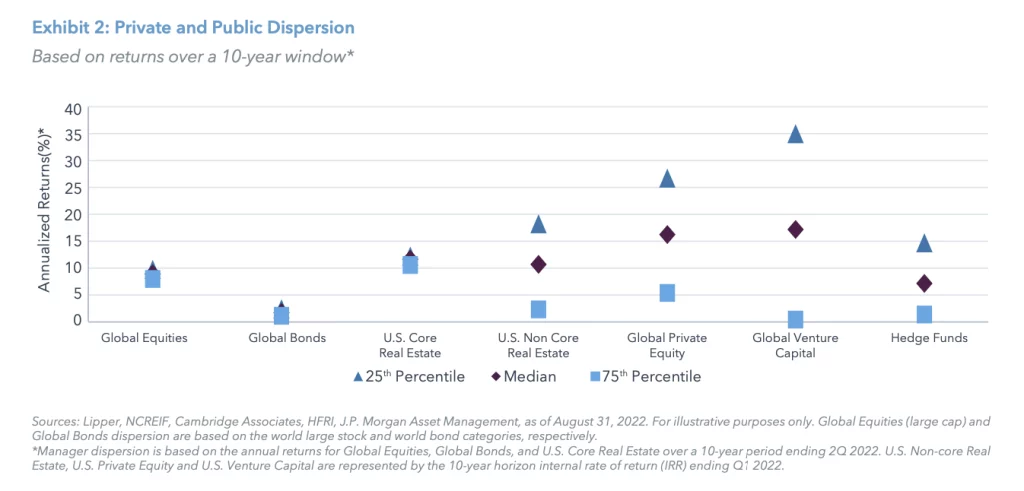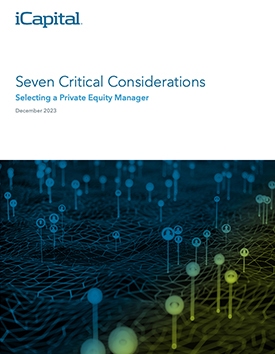Choosing the right private equity manager is crucial in the private markets industry, where the return dispersion is massive. A growing number of individual investors have been taking a closer look at private equity, which has outperformed the MSCI AWCI index by over 700 basis points over the last 20 years (see Exhibit 1).1
While this premium is substantial, it may understate the outperformance of private equity when you consider that the difference between top-quartile and bottom-quartile managers has been over 2,100 basis points over the last decade (see Exhibit 2).2
This dispersion then begs the question: How can an investor increase the likelihood of choosing the best managers in an industry that is thought to be less than transparent? Here are seven critical considerations investors should understand when diligencing and selecting a private equity manager.
1. VALUE CREATION METHODS
There are three primary value creation drivers, and managers usually employ all three. Investors should examine these attributes to look for consistent patterns and assign the highest value to growth in revenue and/ or EBITDA.
- Financial engineering typically refers to increasing a company’s leverage ratio or adjusting the capital structure to boost equity returns. While leverage can be a useful tool to increase returns, it isn’t without risk, as leverage magnifies both potential gains and losses. While applying debt in an acquisition model is an important method to create value (as debt is cheaper than equity), we generally view leverage as a commodity and not a distinct differentiator of creating value. In fact, what we look for is whether the manager has historically used a prudent amount of leverage and not overly relied on it.
- Multiple expansion occurs when a manager sells a portfolio company at a higher entry valuation multiple than the multiple at which the manager acquired it (i.e., buying at 8x EBITDA and selling at 10x EBITDA). This can be evidence of a disciplined buying strategy and/or an experienced manager who knows how to optimize value by choosing the right time to sell. Private equity firms are not paid to time the market, so to speak, and must deploy capital throughout all cycles. So, it is particularly important to examine the entry multiples that a manager paid to acquire companies during frothy parts in the cycle to see if they maintained a disciplined approach.
- Revenue/EBITDA growth is mainly driven through a combination of operational improvements, streamlining costs, add-on acquisitions, organic growth, and/or upgrading members of the senior management team. Essentially, from entry to exit, if a private equity firm implements improvements in a company’s financial performance, it should realize a gain on the investment even if it applied zero leverage and sold the portfolio company at the same multiple at which it was acquired. This is the most important driver and the hardest to consistently generate. Over the past 20 years, as private equity has become more competitive, many top-tier managers have engaged senior operating executives and deepened their industry expertise in order to better implement value creation strategies.
2. INVESTMENT TEAM
It is critical to evaluate the capabilities of the team that will be sourcing, negotiating, monitoring, and exiting the fund investments. Prospective investors should investigate the backgrounds and experience of the investment professionals, as well as the team’s continuity and experience in working effectively together. Investors should also understand the key person provisions in the legal documents to ensure that the appropriate investment professionals will be devoting a specific amount of time to the fund.
It is also important for investors to consider whether the terms of the fund properly align the economic interests of the investment team with those of their investors. If management fees represent a disproportionate amount of the manager’s total compensation, it may reduce the incentive for the team to generate outsized returns. Further, investors should ensure that the most effective members of the investment team (who may not always be the most senior members) receive an appropriate portion of the fund’s carried interest (the private equity firm’s share of profits).
3. DEAL SOURCING AND INVESTMENT PROCESS
A manager’s ability to source a sufficient volume of high-quality investment opportunities is key, and the ability to identify and connect with target companies before competitors is a major differentiator. To generate proprietary opportunities, most private equity managers utilize a combination of their networks, cold calling programs, and the formation of specific investment themes within their core sectors. It is also critical that a manager has a structured process in place to prioritize and evaluate these opportunities efficiently.
4. TRACK RECORD
Investors should use both quantitative and qualitative analyses when examining historical performance. Ideally, investors should analyze the historical performance based on several key attributes in order to properly assess the consistency of a strategy and identify the true value drivers and detractors over time. Focus on attributes such as:
- Sector
- Equity check size
- Source of investment
- Geography
- Lead investment professionals
5. UNREALIZED PORTFOLIO
Typically, a meaningful proportion of a fund manager’s past investments remain unrealized when the manager begins raising capital for the next fund – which can mask a potential deterioration in the manager’s overall track record. It is important to analyze these unrealized companies to try to determine if they are on track to generate returns that will support, or even improve, the current valuation of the fund, or if they are underperforming, which will likely detract from the fund’s overall value. In either case, it is important that the manager has the proper resources to oversee these companies while deploying the new capital raised in the successor fund; any underperforming companies may absorb additional bandwidth as the team works to get them back on track.
6. BENCHMARKING
While a manager’s track record may be attractive on an absolute basis, certain vintage years have outperformed others, due to favorable market conditions. It is vital to compare the manager’s historical performance to other funds in the same vintage year that pursued a similar investment strategy to determine relative performance.
Investors should also compare past performance to a relevant public market benchmark to measure the illiquidity premium that one should expect for investing in a private equity structure without daily liquidity.
7. INVESTMENT STRATEGY & MARKET OPPORTUNITY
Be sure to assess whether the private equity manager’s strategy aligns with the market environment that is expected over the investment period of the fund. Try to confirm that the go forward strategy is consistent with the manager’s past practices. It could be the case that a secular trend that a fund manager benefited from in the past may have run its course, forcing the manager to find opportunities in different sectors or strategies in which the manager has less experience.
CONCLUSION
Private equity funds offer the possibility of strong performance and may be a valuable addition to a well- diversified portfolio, but manager selection is key. As the capital committed to private equity funds continues to grow, the need for a careful, rigorous manager selection process is even more essential.
ENDNOTES
(1) Source: PitchBook, Bloomberg, iCapital Investment Strategy, as of January 3, 2022. Note: All return data is as of March 30, 2022. Global Private Equity is a composite of all private equity funds on the PitchBook platform. Horizon IRR is a cap-weighted pooled calculation that shows the IRR from a certain point in time. Historical IRRs are included solely for the purpose of providing information regarding private market industry returns and returns of other asset classes over certain time periods.
(2) Sources: Lipper, NCREIF, Cambridge Associates, HFRI, J.P. Morgan Asset Management, as of August 31, 2022. For illustrative purposes only. Global Equities (large cap) and Global Bonds dispersion are based on the world large stock and world bond categories, respectively. *Manager dispersion is based on the annual returns for Global Equities, Global Bonds, and U.S. Core Real Estate over a 10-year period ending 2Q 2022. U.S. Non-core Real Estate, U.S. Private Equity and U.S. Venture Capital are represented by the 10-year horizon internal rate of return (IRR) ending Q1 2022
IMPORTANT INFORMATION
The material herein has been provided to you for informational purposes only by Institutional Capital Network, Inc. (“iCapital Network”) or one of its affiliates (iCapital Network together with its affiliates, “iCapital”). This material is the property of iCapital and may not be shared without the written permission of iCapital. No part of this material may be reproduced in any form, or referred to in any other publication, without express written permission of iCapital.
This material is provided for informational purposes only and is not intended as, and may not be relied on in any manner as, legal, tax or investment advice, a recommendation, or as an offer or solicitation to buy or sell any security, financial product or instrument, or otherwise to participate in any particular trading strategy. This material does not intend to address the financial objectives, situation, or specific needs of any individual investor. You should consult your personal accounting, tax and legal advisors to understand the implications of any investment specific to your personal financial situation.
ALTERNATIVE INVESTMENTS ARE CONSIDERED COMPLEX PRODUCTS AND MAY NOT BE SUITABLE FOR ALL INVESTORS. Prospective investors should be aware that an investment in an alternative investment is speculative and involves a high degree of risk. Alternative Investments often engage in leveraging and other speculative investment practices that may increase the risk of investment loss; can be highly illiquid; may not be required to provide periodic pricing or valuation information to investors; may involve complex tax structures and delays in distributing important tax information; are not subject to the same regulatory requirements as mutual funds; and often charge high fees. There is no guarantee that an alternative investment will implement its investment strategy and/or achieve its objectives, generate profits, or avoid loss. An investment should only be considered by sophisticated investors who can afford to lose all or a substantial amount of their investment.
iCapital Markets LLC operates a platform that makes available financial products to financial professionals. In operating this platform, iCapital Markets LLC generally earns revenue based on the volume of transactions that take place in these products and would benefit by an increase in sales for these products.
The information contained herein is an opinion only, as of the date indicated, and should not be relied upon as the only important information available. Any prediction, projection or forecast on the economy, stock market, bond market or the economic trends of the markets is not necessarily indicative of the future or likely performance. The information contained herein is subject to change, incomplete, and may include information and/or data obtained from third party sources that iCapital believes, but does not guarantee, to be accurate. iCapital considers this third-party data reliable, but does not represent that it is accurate, complete and/or up to date, and it should not be relied on as such. iCapital makes no representation as to the accuracy or completeness of this material and accepts no liability for losses arising from the use of the material presented. No representation or warranty is made by iCapital as to the reasonableness or completeness of such forward-looking statements or to any other financial information contained herein.
Securities products and services are offered by iCapital Markets, an SEC-registered broker-dealer, member FINRA and SIPC, and an affiliate of iCapital, Inc. and Institutional Capital Network, Inc. These registrations and memberships in no way imply that the SEC, FINRA, or SIPC have endorsed any of the entities, products, or services discussed herein. Annuities and insurance services are provided by iCapital Annuities and Insurance Services LLC, an affiliate of iCapital, Inc. “iCapital” and “iCapital Network” are registered trademarks of Institutional Capital Network, Inc. Additional information is available upon request.
©2024 Institutional Capital Network, Inc. All Rights Reserved. | 2024.01


















